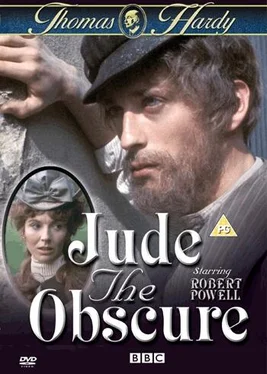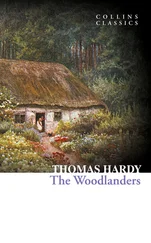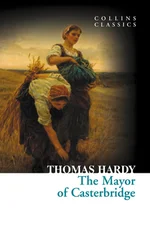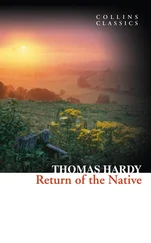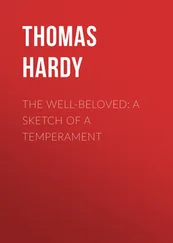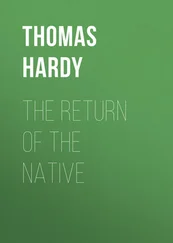It was curious, he thought. What was he reserved for? He supposed he was not a sufficiently dignified person for suicide. Peaceful death abhorred him as a subject, and would not take him.
What could he do of a lower kind than self-extermination; what was there less noble, more in keeping with his present degraded position? He could get drunk. Of course that was it; he had forgotten. Drinking was the regular, stereotyped resource of the despairing worthless. He began to see now why some men boozed at inns. He struck down the hill northwards and came to an obscure public-house. On entering and sitting down the sight of the picture of Samson and Delilah on the wall caused him to recognize the place as that he had visited with Arabella on that first Sunday evening of their courtship. He called for liquor and drank briskly for an hour or more.
Staggering homeward late that night, with all his sense of depression gone, and his head fairly clear still, he began to laugh boisterously, and to wonder how Arabella would receive him in his new aspect. The house was in darkness when he entered, and in his stumbling state it was some time before he could get a light. Then he found that, though the marks of pig-dressing, of fats and scallops, were visible, the materials themselves had been taken away. A line written by his wife on the inside of an old envelope was pinned to the cotton blower of the fireplace:
" Have gone to my friends. Shall not return. "
All the next day he remained at home, and sent off the carcase of the pig to Alfredston. He then cleaned up the premises, locked the door, put the key in a place she would know if she came back, and returned to his masonry at Alfredston.
At night when he again plodded home he found she had not visited the house. The next day went in the same way, and the next. Then there came a letter from her.
That she had gone tired of him she frankly admitted. He was such a slow old coach, and she did not care for the sort of life he led. There was no prospect of his ever bettering himself or her. She further went on to say that her parents had, as he knew, for some time considered the question of emigrating to Australia, the pig-jobbing business being a poor one nowadays. They had at last decided to go, and she proposed to go with them, if he had no objection. A woman of her sort would have more chance over there than in this stupid country.
Jude replied that he had not the least objection to her going. He thought it a wise course, since she wished to go, and one that might be to the advantage of both. He enclosed in the packet containing the letter the money that had been realized by the sale of the pig, with all he had besides, which was not much.
From that day he heard no more of her except indirectly, though her father and his household did not immediately leave, but waited till his goods and other effects had been sold off. When Jude learnt that there was to be an auction at the house of the Donns he packed his own household goods into a waggon, and sent them to her at the aforesaid homestead, that she might sell them with the rest, or as many of them as she should choose.
He then went into lodgings at Alfredston, and saw in a shopwindow the little handbill announcing the sale of his father-in-law's furniture. He noted its date, which came and passed without Jude's going near the place, or perceiving that the traffic out of Alfredston by the southern road was materially increased by the auction. A few days later he entered a dingy broker's shop in the main street of the town, and amid a heterogeneous collection of saucepans, a clothes-horse, rolling-pin, brass candlestick, swing looking-glass, and other things at the back of the shop, evidently just brought in from a sale, he perceived a framed photograph, which turned out to be his own portrait.
It was one which he had had specially taken and framed by a local man in bird's-eye maple, as a present for Arabella, and had duly given her on their wedding-day. On the back was still to be read, " Jude to Arabella ," with the date. She must have thrown it in with the rest of her property at the auction.
"Oh," said the broker, seeing him look at this and the other articles in the heap, and not perceiving that the portrait was of himself: "It is a small lot of stuff that was knocked down to me at a cottage sale out on the road to Marygreen. The frame is a very useful one, if you take out the likeness. You shall have it for a shilling."
The utter death of every tender sentiment in his wife, as brought home to him by this mute and undesigned evidence of her sale of his portrait and gift, was the conclusive little stroke required to demolish all sentiment in him. He paid the shilling, took the photograph away with him, and burnt it, frame and all, when he reached his lodging.
Two or three days later he heard that Arabella and her parents had departed. He had sent a message offering to see her for a formal leave-taking, but she had said that it would be better otherwise, since she was bent on going, which perhaps was true. On the evening following their emigration, when his day's work was done, he came out of doors after supper, and strolled in the starlight along the too familiar road towards the upland whereon had been experienced the chief emotions of his life. It seemed to be his own again.
He could not realize himself. On the old track he seemed to be a boy still, hardly a day older than when he had stood dreaming at the top of that hill, inwardly fired for the first time with ardours for Christminster and scholarship. "Yet I am a man," he said. "I have a wife. More, I have arrived at the still riper stage of having disagreed with her, disliked her, had a scuffle with her, and parted from her."
He remembered then that he was standing not far from the spot at which the parting between his father and his mother was said to have occurred.
A little further on was the summit whence Christminster, or what he had taken for that city, had seemed to be visible. A milestone, now as always, stood at the roadside hard by. Jude drew near it, and felt rather than read the mileage to the city. He remembered that once on his way home he had proudly cut with his keen new chisel an inscription on the back of that milestone, embodying his aspirations. It had been done in the first week of his apprenticeship, before he had been diverted from his purposes by an unsuitable woman. He wondered if the inscription were legible still, and going to the back of the milestone brushed away the nettles. By the light of a match he could still discern what he had cut so enthusiastically so long ago:

The sight of it, unimpaired, within its screen of grass and nettles, lit in his soul a spark of the old fire. Surely his plan should be to move onward through good and ill—to avoid morbid sorrow even though he did see uglinesses in the world? Bene agere et lœtari —to do good cheerfully—which he had heard to be the philosophy of one Spinoza, might be his own even now.
He might battle with his evil star, and follow out his original intention.
By moving to a spot a little way off he uncovered the horizon in a north-easterly direction. There actually rose the faint halo, a small dim nebulousness, hardly recognizable save by the eye of faith. It was enough for him. He would go to Christminster as soon as the term of his apprenticeship expired.
He returned to his lodgings in a better mood, and said his prayers.
Part Second
AT CHRISTMINSTER
"Save his own soul he hath no star."
Swinburne
"Notitiam primosque gradus vicinia fecit;
Читать дальше
